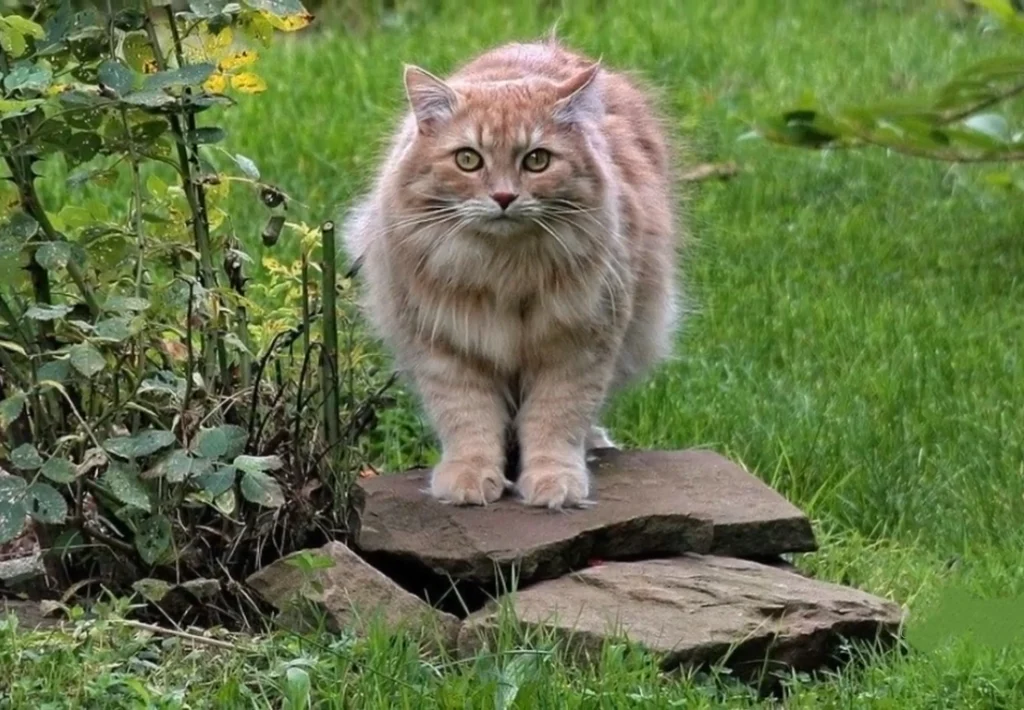Siberian Cat Lifespan: Understanding Their Longevity and Care Needs
By: Dorris Abraham

The information in this article is intended to educate cat parents and is not a substitute for veterinary guidance. In case of any concerns about your cat’s health, please talk with your veterinarian.
Siberian cats are known for their striking beauty and playful nature. These cats generally live between 12 and 15 years, although some can live longer with proper care. Many factors affect their lifespan, including genetics, diet, and living environment.
This breed is robust and adaptable, thriving in various conditions. Regular veterinary check-ups and good nutrition can contribute significantly to their longevity. Understanding their needs will help owners provide a healthy and happy life for their Siberian cats.
Key Takeaways:
- Siberian cats typically live between 12 and 15 years.
- Proper care enhances the chances of a longer life.
- An active lifestyle and routine vet visits are crucial for their health.
Click to know about the stunning: Maine Coon Colors & Patterns
Understanding the Siberian Cat Breed
Siberian cats are known for their striking looks and friendly nature. This breed stands out with its unique characteristics and rich history, which tie back to their origins in Russia.
Click to explore: Lynx Point Ragdoll Cat Breed
Characteristics and Appearance
Siberian cats are medium to large in size, with a sturdy build. They have a strong, muscular body covered in semi-longhaired fur that helps them adapt to cold climates. Their coats come in various colors, including the popular golden tabby pattern. The breed is known for its large, rounded paws and tufted ears, which enhance their forest cat appearance.
Their expressive eyes can be green, gold, or blue, often giving them an intelligent look. Siberians are also known for their playful and affectionate behavior, making them great companions. They are friendly with both people and other pets, which makes them a good choice for families.
Click to explore: Siberian Cat Size Comparison
Breed History and Origins
The Siberian cat is considered the national cat of Russia. Its roots trace back over 1,000 years, making it one of the oldest domestic breeds. This breed is closely related to the Norwegian Forest cat, sharing many similar features.
Siberian cats were used for their hunting skills and were valued for their ability to catch rodents. In the 1980s, they began to gain popularity outside of Russia, leading to their recognition by organizations like TICA, CFA, and FIFe. The Neva Masquerade is a color-point variation of the Siberian, known for its striking markings. This breed’s long history contributes to its unique charm and appeal in the cat world.
Click to know about: Silver Siberian Cat
Siberian Cat Lifestyle and Behavior
Siberian cats have a distinct lifestyle and behavior that make them unique. They are known for their playful and affectionate nature, making them great companions. Understanding their temperament and how they adapt to living situations is important for potential owners.
Typical Temperament
Siberian cats are known for their friendly and outgoing personalities. They often seek interaction with their humans and enjoy being part of family activities.
- Affectionate: They are very loving and often bond closely with their owners. They enjoy cuddling and being petted.
- Playful: These cats have a playful side and enjoy engaging with toys. Regular playtime helps keep them happy and healthy.
- Intelligent: Siberians are smart and curious. They like puzzles and games that challenge their minds.
- Loyal: These cats form strong attachments to their families. They will often follow their owners around the house, showing their loyalty.
Living with a Siberian Cat
Living with a Siberian cat can be rewarding. They adapt well to different environments but thrive in homes where they can play and explore.
- Indoor Cats: Siberians are primarily indoor cats. They need space to play and climb, so providing vertical spaces like cat trees is important.
- Social Interaction: They enjoy companionship and do not like to be left alone for long periods. Having another pet can help keep them entertained.
- Routine: Establishing a daily routine for feeding and playtime helps them feel secure and content.
- Exercise Needs: Regular playtime is crucial to meet their energy levels. Engaging them with interactive toys can provide physical and mental stimulation.
Siberian cats contribute warmth and joy to a home. Their combination of affection and playfulness makes them delightful companions.
Health and Care of Your Siberian Cat
Taking care of a Siberian cat involves understanding their specific health needs and ensuring they receive a proper diet. Attention to these areas can help improve their quality of life and lifespan.
Common Health Considerations
Siberian cats are generally healthy, but they can face certain health issues. One concern is Pyruvate Kinase Deficiency (PKD), a genetic disorder that affects red blood cells. This condition can lead to anemia, so regular veterinary check-ups are crucial for early detection.
Other common issues may include heart disease, hip dysplasia, and respiratory problems. Owners should watch for symptoms like lethargy, difficulty breathing, and changes in appetite. Regular vaccinations and preventive care can help keep them healthy.
Click to explore: Persian Cat Lifespan
Optimal Diet for Longevity
A balanced diet is essential for the long-term health of Siberian cats. High-quality cat food should be high in protein and low in carbohydrates. Ingredients like chicken, turkey, and fish are excellent choices.
Key nutrients include omega fatty acids for skin and coat health, taurine for heart health, and fiber for digestion. Owners should consult with a vet to find the best diet tailored to their cat’s age and health needs.
Providing fresh water is equally important. Some cats prefer running water, so a cat fountain may encourage them to drink more. Regular feeding schedules also help maintain a healthy weight.
Click to learn about fascinating: Bobtail Cat Breeds
Frequently Asked Questions
Siberian cats are known for their beauty and friendly nature. Many people want to know about their lifespan and factors that can affect it.
Conclusion
Siberian cats are a remarkable breed, known for their striking appearance, affectionate nature, and impressive lifespan of 12 to 15 years. With proper care, including a balanced diet, regular veterinary check-ups, and an active lifestyle, these cats can thrive and even surpass their average lifespan. Their adaptability and robust health make them ideal companions for families seeking a long-term feline friend.
Understanding the unique needs of Siberian cats, from their playful temperament to their specific health considerations, ensures they live a happy and healthy life. By providing a nurturing environment and addressing potential health issues early, owners can enjoy the companionship of these majestic cats for many years.

About the Author
Dorris Abraham
Dorris, a skilled writer with a degree in English, combines her lifelong love for cats with years of expertise in feline behavior and care. A proud pet parent and passionate advocate for pedigreed and fluffy breeds, she creates authoritative, engaging blogs that inform and inspire cat lovers everywhere.
